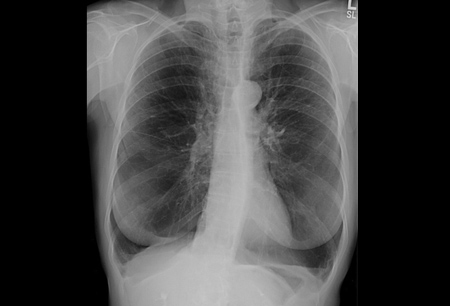Resumo
Definição
História e exame físico
Principais fatores diagnósticos
- tos productiva
- disnea de esfuerzo
- fumador actual
- exposición a gas, emanaciones y/o polvo
- hepatomegalia
- ascitis
- confusión
Outros fatores diagnósticos
- 32-41 años de edad
- sexo masculino
- sibilancia
- tórax distendido
- ictericia conjuntival/ictericia
- asterixis
Fatores de risco
- antecedentes familiares de déficit de AAT
Investigações diagnósticas
Primeiras investigações a serem solicitadas
- nivel plasmático de alfa-1-antitripsina (AAT)
- pruebas funcionales respiratorias
- radiografía de tórax
- tomografía computarizada (TC) de tórax
- pruebas de función hepática (PFH)
Investigações a serem consideradas
- fenotipado
- genotipado
- secuencia de genes
- pruebas de ejercicio con análisis de gasometría arterial (GSA)
- alfafetoproteína
- ecografía hepática
- tomografía computarizada (TC) del abdomen
- resonancia magnética (IRM) abdominal
- biopsia hepática
Algoritmo de tratamento
alfa-1-antitripsina (AAT) plasmática baja
Colaboradores
Autores
D. Kyle Hogarth, MD, FCCP

Professor
Pulmonary and Critical Care
University of Chicago
Chicago
IL
Declarações
DKH is a consultant for Grifols, Takeda, and Wave Life Sciences, and gives lectures for Takeda; Grifols and Takeda are both makers of alpha-1 antitrypsin related products. DKH serves on the MASEK committee for the Alpha One Foundation, and is part of the A1BC study sponsored by the National Institutes of Health and the Alpha One Foundation. DKH is an author of a number of references cited in this topic.
Agradecimentos
Dr D. Kyle Hogarth would like to gratefully acknowledge Dr Paul J. Hutchison, a previous contributor to this topic.
Declarações
PJH declares that he has no competing interests.
Revisores
Jane Deng, MD
Assistant Professor of Medicine
David Geffen School of Medicine at UCLA
Los Angeles
CA
Declarações
JD declares that she has no competing interests.
Franck Rahaghi, MD
Chair of Quality
Director
Pulmonary Hypertension Clinic
Head
Pulmonary Education and Rehabilitation
Department of Pulmonary, Allergy and Critical Care
Cleveland Clinic Florida
Weston
FL
Declarações
FR has been a consultant and speaker and has received funding from Baxter Healthcare and CSL Behring.
Graeme P. Currie, MD, FRCP
Consultant Chest Physician
Aberdeen Royal Infirmary
Aberdeen
UK
Declarações
GPC declares that he has no competing interests.
Créditos aos pareceristas
Os tópicos do BMJ Best Practice são constantemente atualizados, seguindo os desenvolvimentos das evidências e das diretrizes. Os pareceristas aqui listados revisaram o conteúdo pelo menos uma vez durante a história do tópico.
Declarações
As afiliações e declarações dos pareceristas referem--se ao momento da revisão.
Referências
Principais artigos
American Thoracic Society/European Respiratory Society Statement. Standards for the diagnosis and management of individuals with alpha 1-antitrypsin deficiency. Am J Respir Crit Care Med. 2003 Oct 1;168(7):818-900.Texto completo Resumo
Sandhaus RA, Turino G, Brantly ML, et al. The diagnosis and management of alpha-1 antitrypsin deficiency in the adult. Chronic Obstr Pulm Dis (Miami). 2016 Jun 6;3(3):668-82.Texto completo Resumo
Marciniuk DD, Hernandez P, Balter M, et al. Alpha-1 antitrypsin deficiency targeted testing and augmentation therapy: a Canadian Thoracic Society clinical practice guideline. Can Respir J. 2012;19:109-116.Texto completo Resumo
Hill AT, Sullivan AL, Chalmers JD, et al. British Thoracic Society Guideline for bronchiectasis in adults. Thorax. 2019 Jan;74(suppl 1):1-69.Texto completo Resumo
Fraughen DD, Ghosh AJ, Hobbs BD, et al. Augmentation therapy for severe alpha-1 antitrypsin deficiency improves survival and is decoupled from spirometric decline-A multinational registry analysis. Am J Respir Crit Care Med. 2023 Nov 1;208(9):964-74.Texto completo Resumo
Artigos de referência
Uma lista completa das fontes referenciadas neste tópico está disponível para os usuários com acesso total ao BMJ Best Practice.

Diagnósticos diferenciais
- Asma
- Enfermedad pulmonar obstructiva crónica (EPOC)
- Bronquiectasias
Mais Diagnósticos diferenciaisDiretrizes
- EASL Clinical Practice Guidelines on genetic cholestatic liver disease
- EASL Clinical Practice Guidelines on genetic cholestatic liver diseases
Mais DiretrizesFolhetos informativos para os pacientes
EPOC: ¿Qué tratamiento funciona?
EPOC: ¿Qué es?
Mais Folhetos informativos para os pacientesConectar-se ou assinar para acessar todo o BMJ Best Practice
O uso deste conteúdo está sujeito ao nosso aviso legal